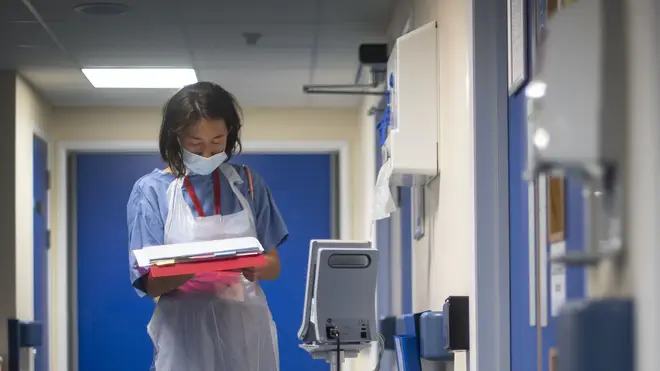
Simon Marks 4pm - 7pm
25 November 2020, 00:00 | Updated: 25 November 2020, 07:48

The Government spent an extra £10 billion in inflated prices for PPE as it tried to fix an "inadequate" pandemic stockpile, it has been revealed.
The Department for Health and Social Care (DHSC) faced excessive prices for safety kit as Covid-19 gripped the country and officials rushed to fill major gaps in neglected NHS reserves, a report from the National Audit Office (NAO) found.
Procurement chiefs paid up to 1,300% more for missing items compared to prices last year, including a 166% increase in the cost of respirator masks and a 1,310% increase in the price of body bags.
Between February and July, the department spent £12.5 billion on 32 billion items of PPE - stock that could have been bought for £2.5bn in 2019.
Read more: Christmas saved as government allows three households to celebrate for five days
Read more: Rishi Sunak to reveal Covid crisis' impact on public finances
In its report published on Wednesday, the NAO noted that providers made a "huge effort" to boost personal protective equipment (PPE) supplies as they realised that the country's stockpiles, first created in 2009 for flu-style pandemic, would not be sufficient.
But, with the impact of the pandemic already starting to be felt across the world by early spring, officials paid "very high prices given the very unusual market conditions", the report said.

Rishi Sunak will reveal the Covid crisis' impact on public finances, says economist
The findings come only a week after the Government spending watchdog found there was a "high-priority lane" for PPE suppliers recommended by ministers' offices, MPs, peers and senior NHS staff.
Around one in 10 companies went through this route to get a contract, compared with one in 100 for those in the "ordinary lane".
The Government has come under fire in recent months for handing out major PPE contracts to firms connected to ministers, Conservative MPs and Government officials.
NAO boss Gareth Davies said: "As PPE stockpiles were inadequate for the pandemic, Government needed to take urgent action to boost supplies.
"Once it recognised the gravity of the situation ... the price of PPE increased dramatically, and that alone has cost the taxpayer around £10 billion."
Read more: MPs 'shouldn't get pay rise' if public sector workers don't
Read more: Rishi Sunak vows £2.9bn to help covid generation get jobs
It was revealed in April that ministers had repeatedly ignored warnings from health officials about gaps in the stockpile meant for a flu outbreak.
There were no gowns, visors, swabs or body bags in reserve when Covid-19 hit the UK - some of which the Government's New and Emerging Respiratory Virus Threats Advisory Group (Nervtag) recommended in June 2019.
Meg Hillier, chairwoman of the Commons Public Accounts Committee, accused ministers of being "far too slow" to respond and said they were left paying "through the roof" for the frontline equipment.

Boris Johnson issues Christmas message as Govt confirms households can mix over Christmas
"The pandemic caught the NHS on the wrong foot. The national stockpile was nowhere near big enough for a coronavirus outbreak - a consequence of the pandemic plans' fixation on influenza," the Labour MP said.
"The Government was far too slow to recognise how precarious the position was. When the penny finally dropped, DHSC had to scramble to buy what was left as prices went through the roof."
Last-ditch efforts also meant that critical PPE did not arrive in time for the first wave, the NAO report found, with action now being taken to stockpile gear for future use by NHS and social care staff.
Of the 32 billion items of PPE procured between February and July, less than 10% made it to the frontline in that period, with stock levels for most protective equipment "negligible" in April and May - critical months during the first wave.
Read more: Weekly coronavirus deaths pass 2,000 for first time since May
Read more: Hospitality industry fury over tough Tiers post-lockdown
Shadow health minister Justin Madders said: "This report confirms that frontline workers didn't have access to adequate PPE early on in the pandemic, putting them at unnecessary risk.
"There is no doubt that a significant reason for the shortage was the Government's failure to prepare properly and take on board warnings about PPE stockpiles."
The findings come as the Public Accounts Committee concluded, in a report also published on Wednesday, that ministers "lost a crucial month" when dealing with the shortage of ventilators to deal with Covid-19 due to being "underprepared" and reacting slowly.